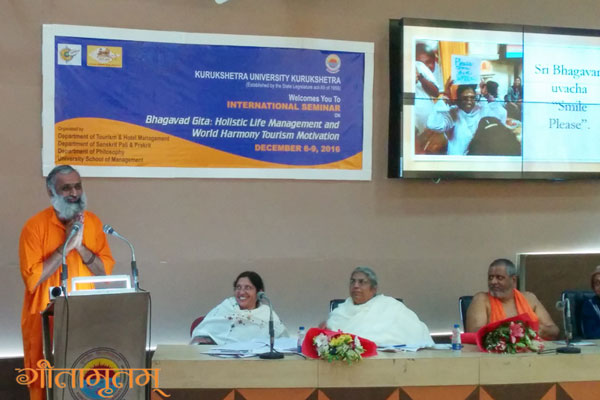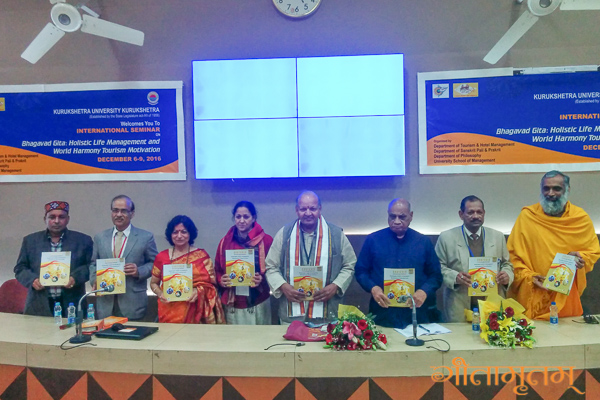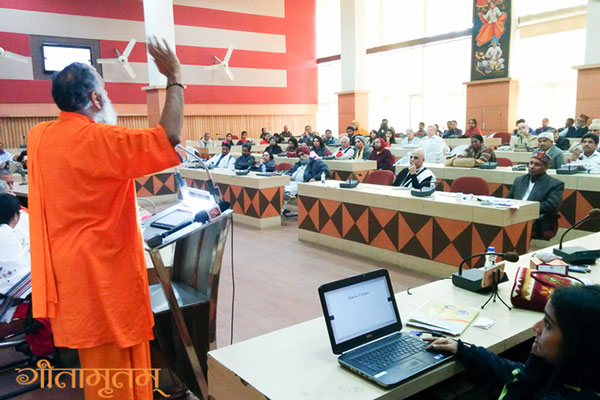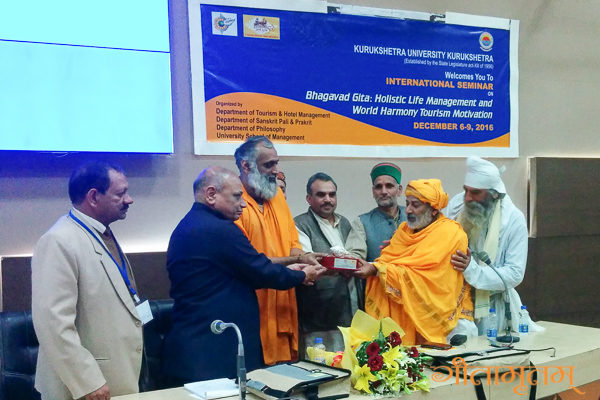Introduction:
(This is from the paper presented on Bhagavad Gita at the International Seminar held at Kurukshetra University, Haryana in connection with Gita Jayanthi celebrations on 6 Dec 2016)

Bhagavad Gita, the sacred and respected treasure of India is strangely deemed relevant only to the old and dying so that they spend their last days pondering on greater things in life. While it is actually for the young, dynamic mind, who are hungry to achieve in life so that they spend the rest of the lives living Gita and not dying with it. This article throws light into the situation which made Arjuna ask this most wonderful question in the midst of a war field. And this very question transforms Arjuna into a seeker of truth.
Arjuna was very successful in all his endeavours and was looked upon by many as a model. In spite of having everything that one craves in life be it fame, wealth or any such possession, he found something lacking in life. What that tells us is that even if we reach high levels of accomplishment, we would still be asking the same question – ‘How can I be happy’? All of us were able to smile at everyone out of joy, all around the globe, at the animate and inanimate, without any differences…when we were all babies. And we lose that blessing as we grow. What have we lost, where have we lost, how we have lost that smile?
And Bhagavad Gita gives you the key to answer this as learning Gita is to become Krishna himself. Sri Krishna is smiling under any circumstances as he is always aware of living in the present. If you want to be happy, be happy right now as happiness is always in the present. Let all your actions not be for the happiness and let it come out of happiness. Instead of becoming happy, be happy. Now or never.
- Who can laugh?
Sri Krishna is the master of finesse throughout the Mahabharata, playing innumerable roles as a friend, strategist, mentor, peace messenger, teacher etc. What is so special about him? It was definitely his ability to smile in any situation. With only a flute in his hand, he remained calm revelling in the equanimity of his mind while others were so tensed engulfed with confusion. Others were in anger, hatred and in tears. Sri Krishna was in love, music and with a smile. Sri Krishna starts Gita with “ashochyan anwa socatwam..” in the 2nd chapter and ends with “..ma sucha:” in the 18th chapter. Basically both meaning “don’t worry”. From this, the message of Gita can be summarised as “remove sorrow and always be happy”
As Sanjaya honestly narrated the happenings to King Drithirashtra, he does not forget to capture the smile of Sri Krishna in the second chapter.
तमुवाच हृषीकेशः प्रहसन्निव भारत ।
सेनयोरुभयोर्मध्ये विषीदन्तमिदं वचः ॥
tam uvāca hṛṣīkeśaḥ prahasann iva bhārata
senayor ubhayor madhye viṣīdantam idaṃ vacaḥ
O Bharata, to him, who was despondent in the midst of the two armies,
Sri Krishna smilingly spoke these words. 2-10
It is quite unique to see someone smiling in the midst of a war. Who do you think can laugh? The one who knows the truth of the universe and that nothing is permanent here, only can laugh.
A little boy and his mother were visiting a fair. Like most of the celebrations, brightly lit lamps and decorations adorned the place. A bunch of colourful balloons of various sizes and shapes caught the little one’s attention. He asked his mother to get him one. From asking, it became pestering as the mother refused to get it for him. The child didn’t give up and ultimately got what he wanted. He jumped with joy, proudly displaying his prized possession. After a while, the balloon burst and the child began to cry. But the mother didn’t cry or scold the child, instead, she smiled. Why? This is because the mother knew that the balloon will burst any time, but the child didn’t. Our body is similar to a balloon which can burst anytime.
It’s easy to smile. But can we smile always? In any situation of life? In victory maybe, but not in failure for sure. When we gain – yes, but when we lose? In joy – very much, in pain- no way. But if you can smile in failures, you will win. The question that we have to ask ourselves is ‘will we still smile or cry when our body bursts’? Sri Krishna is asking us to smile. Those who can smile at death will become immortal. If you can remain undisturbed in all the situations of life, you are eligible for Amritam… (2.15)
यं हि न व्यथयन्त्येते पुरुषं पुरुषर्षभ ।
समदुःखसुखं धीरं सोऽमृतत्वाय कल्पते ॥
yaṃ hi na vyathayanty ete puruṣaṃ puruṣarṣabha
samaduḥkhasukhaṃ dhīraṃ somṛtatvāya kalpate
That wise man who is not troubled by these (opposites of life),
who remains equanimous in pleasure and pain, he is fit for immortality. 2-15
- Eligibility for Gita
There is a misunderstanding that we need some qualification to be eligible to study Gita, some even think that we should be a Mumukshu (one who is thirsty to know) to taste and relish Gita. If the student has to be a mumukshu then the teacher should have to be a Mukta –the one who is free from the chains of sorrow. I really doubt how many will be there like that. That is why Sage Vyasa portrays the characters of Arjuna and Drithirashtra who are like each of us to prove his point. Arjuna, the first person to listen is not a mumukshu. He is utterly confused, dejected, wants to run away from his Dharma as a warrior. Drithirashtra the second person to hear was holding on to power and position – druta: rashtra: ena saha drutarashtah. He was not at all interested, attached to the kingdom and his children, blind –not just externally but internally too. Both of them heard the Gita, but did it have the same effect? While Arjuna’s confusion cleared, he got inspired and plunged into action for the establishment of Dharma, nothing happened to Drithirashtra. Arjuna was not a perfect adhikari, endowed with samadi shadka sampathi. Of course, he was cultured and intelligent, no doubt. Unless you are ready, nothing would happen with Gita.
Amma, SatGuru, Sri Mata Amritanandamayi Devi says “When somebody is dispassionate and has compassion, Gita will happen to them”. So when we have an attitude ‘ I don’t want anything’ and ‘how can I hurt others’ with a desire to know the way to come out of the sorrow and attain permanent happiness, the Lord appears and gives us wisdom.
- Formula of Gita
Gita can be simplified as this, in just 5 points.
- As a warrior, Arjuna wanted to perform dharma and had come to the battlefield.
- On seeing his family members, friends and well-wishers in the battlefield, Arjuna didn’t want to do his dharma.
- Arjuna wanted to run away from his dharma.
- Arjuna wanted to embrace someone else’s dharma by taking up Sanyas.
- To that Arjuna, Sri Krishna says: “Partha, you do your dharma at any cost”
and this timeless conversation between the two is Bhagavad Gita.
Arjuna didn’t ask for realization or Moksha. Worried about society, he didn’t want to fight to get the kingdom. Even though his priorities were misplaced and immature, he was compassionate. Moreover, he accepted that he was confused and surrendered to Krishna to provide a solution. “yat shreyah a syaat nishchitam broohi tanme” All that he asked was to enjoy permanent happiness.
कार्पण्यदोषोपहतस्वभावः
पृच्छामि त्वां धर्मसम्मूढचेताः ।
यच्छ्रेयः स्यान्निश्चितं ब्रूहि तन्मे
शिष्यस्तेऽहं शाधि मां त्वां प्रपन्नम् ॥
kārpaṇyadoṣopahatasvabhāvaḥ
pṛcchāmi tvāṃ dharmasaṃmūḍhacetāḥ
yac chreyaḥ syān niścitaṃ brūhi tan me
śiṣyastehaṃ śādhi māṃ tvāṃ prapannam
My heart is overpowered by pity. My mind is confused as to duty.
I ask you, tell me decisively what is good for me.
I am your disciple. Instruct me who has taken refuge in you. 2-7
What Arjuna seeks is permanent happiness – shreyas, not preyas – temporary joy. And he wanted to be instructed clearly by Krishna in order to achieve it. For that purpose, Arjuna seeks Sri Krishna’s guidance. This is the beginning of Gita gyan.
Sri Krishna was in fact the best psychologist. He transformed Arjuna’s mind, removed the confusion and instilled an interest in the enquiry of the reality. By the end of the second chapter, Arjuna even goes to the extent of asking about “sthitha pragyna lakshanam!!!” From confusion and depression, he metamorphosed into a jignyasu through this discussion with the Lord. Sri Krishna inculcated a level of curiosity which transformed and made him inquire to be a perfect man in this imperfect world. A real Guru is the one who inspires and helps us to achieve the goal of life.
4.Yoga of Depression
The first chapter of Gita is called the vishada yoga or the yoga of depression. Interesting? When we are too attached to anything, and when we lose it, that sorrow may lead to depression. Sorrow happens in everybody’s life. It has happened to me, it may have or will happen to you too.
Look at the youngsters around us. For some of them, their happiness is directly proportional to the number of friends and likes on Facebook. For some, the quantity of marks is more important than the quality of knowledge gained. Some commit suicide for just losing a mark in an exam or if parents had banned the usage of Facebook during exams. Where are they headed in life??
Eventually, they end up losing interest in life and become a useless piece of flesh and a burden to the society. All of us get into this state if we don’t know how to manage our sorrows. If our sorrows are not managed right, it is very easy to slip into depression. When the pain is unbearable, they commit suicide.
The study says that 36% of the people in India are depressed 2. Out of every 1 lakh people, 1400 are depressed, among which a vast majority are the youth. We have a taboo over mental health. Now the society is slowly coming out of this taboo. Recently, the film star, Deepika Padukone has announced that she is battling depression and has been under medication. But many hide their face from reality. Interestingly Arjuna realises his mistakes, accepts it and expresses his desire to come out of it. It’s a very positive attitude. I feel that it’s because of the cultural upbringing that he evaluates and finds something is wrong in his thinking.

The above news clippings show that the gain of material wealth and knowledge is not sufficient to be content and happy in life. Whatever you may achieve, sorrow will be visiting you, like, not receiving the expected salary, promotion, emotional support etc. This first chapter of Gita happens in everyone’s life. But unfortunately, they also don’t proceed to the second chapter of Gita.
Sorrows in life are inevitable, but suffering is an option. Like a grain of sand that had fallen into an oyster’s shell and turns into a priceless pearl; when sorrow offered at the feet of the Lord is converted into a pearl of wisdom. It becomes yoga. Arjuna offered his sorrows at the feet of the Lord, vishada became vishada yoga! When we have a friend like Krishna and make friendship with him, then enters the second chapter called Sankhya /Jnana yoga into our lives. We need a Guru like Krishna to remove ignorance and bring wisdom. Around a Guru, the confusion disappears like the rays of the sun removing darkness.
Through a GitaHaiku* I will try to picturise it
War in the waxing moon
Clouds of sorrow and tears of rain
Gita-light thunders.
- Sorrow is inevitable, never brood over it
All of us experience pain in life but what we take of it is very important. We can crib and suffer for the rest of life or learn a lesson from it. Many of us spend our lives brooding over our sorrows, shoka forever. Its called Anu-sochanam. While a son died at the age of 17, the mother would cry, it’s natural. But she keeps crying for him even at the age of 70? Then she lives her complete life brooding over her past. That’s not good. The sufferings are like a test given to us by the Lord to see if we can pass the exam called Life. Only if you pass the class, you are promoted. If you fail, you are kept in the same class till you learn.
Here I would like to share a beautiful story by Amma.
A man standing in the top floor of a building sees his friend walking down the busy noisy lane and throws a flower to get his attention. The friend takes the flower and continues walking without responding. Next, he throws a coin at him and he simply picks it up and walks away. Finally, he throws a stone and immediately the friend looks up in anger, to find out the person who did this. When a gift is given to us we don’t recognise and value it. Same is the case of wealth, we show no gratitude. But when pain is given to us, we immediately respond. Only then do we lookup. There is always a hidden lesson in every pain that we have experienced or going to experience, and a wise man knows this. It is all for turning your attention towards the divine and to proceed in that direction. Wisdom teaches you how to act in life and be happy and how not to have sorrow.
It is not action but the attitude that matters. Amma says, “Arjuna was in the midst of a war-field, his war is turned into a yagna and the Daksha Prajapathi in the yagna–shala turned his yagna into a war”. It is very important to convert every action into a way of worship. This is the message of Gita.
The nature of the world is such that, we will be caught in between the extremes, like darkness and light, heat and cold etc. We will be experiencing a potpourri of emotions right from joy, sadness, victory, failures, fears etc. We cannot run away from it or do we have the option to choose according to our likes. The only appropriate question that we must be asking is “How to face it?” in spite of how the emotion is to you. Not changing the face, but facing the change is what is required.
किं पुनर्ब्राह्मणाः पुण्याः भक्ता राजर्षयस्तथा ।
अनित्यमसुखं लोकं इमं प्राप्य भजस्व माम् ॥
kiṃ punar brāhmaṇāḥ puṇyāḥ bhaktā rājarṣayas tathā
anityam asukhaṃ lokam imaṃ prāpya bhajasva mām
… There fore having reached this impermanent
and sorrowful world, worship me devoutly. 9-33
Such is the nature of the world, temporary and unpleasant; it is not made for enjoyment. The sea is not made for swimming, so don’t complain if you drown. If you learn, you can swim. For a swimmer each wave is thrilling and swimming is an enjoyable activity. But for someone who doesn’t know swimming and is afraid of water, it could be the worst or the last experience ever. We see different types and magnitude of waves like sukha, dukha, jaya, parajaya, laabha, nashta etc which keeps appearing intermittently in our life. The mantra is learning how to be steady in continuous flux and keep going. Life is like a sea and we must learn to surf in it.
Recently I came across a young boy, software engineer, who is afraid of being happy. He doesn’t interact with friends, don’t take part in party or festivals, not even smile with his own family members, forget about laughing. But he is very ‘religious’!! Later I came to know that his whole family is like that. He is afraid if he is happy, something bad will come to him later. So in order to avoid unhappiness, he is not enjoying life now. He doesn’t want to be happy. What a paradox!
To be victorious one needs to be mastering in the basics. In the second chapter, Sri Krishna was telling Arjuna how important these basics are, and how it will remove sorrow in life.
- Every joy is followed by sorrow. Every sorrow is followed by joy.
- Nothing or nobody can give you permanent happiness.
- Everything in this world is undergoing change continuously.
- The change will lead up to death or will end up being lost.
- We will always find a better person or an object.
These are five basic defects of everything in this world. Understanding which, one can be happy.
6.The real question
At the beginning of the Gita, Arjuna posts about 23 statements and two questions.
तस्मान्नार्हा वयं हन्तुं धार्तराष्ट्रान्स्वबान्धवान् ।
स्वजनं हि कथं हत्वा सुखिनः स्याम माधव ॥
tasmān nārhā vayaṃ hantuṃ dhārtarāṣṭrān svabāndhavān
svajanaṃ h kathaṃ hatvā sukhinaḥ syāma mādhava
Therefore, we should not kill the sons of Dhrutarashta, our relatives;
for how can we be happy by killing our own people Oh Madhava? 1-37
One of that being, “Swajanam hatva kadam sukhinashyama madhava”? By killing my people, how can I be happy? Even if I enjoy my kingdom without any borders and enemies, even if I conquer the heavens, all this enjoyment through the indriyas will drain me. So, Oh Lord, please instruct me throughout the way to achieve ultimate happiness. This was Arjuna’s real question. But unfortunately, all the commentaries on Gita, gives too much of stress on the killing of relatives than his concern for happiness. It’s not a big issue for Arjuna since he had defeated all these Kauravas by himself just four months back when they stole the cows from the palace of Virata. Arjuna’s second question was regarding the attainment ultimate happiness.
कार्पण्यदोषोपहतस्वभावः
पृच्छामि त्वां धर्मसम्मूढचेताः ।
यच्छ्रेयः स्यान्निश्चितं ब्रूहि तन्मे
शिष्यस्तेऽहं शाधि मां त्वां प्रपन्नम् ॥
kārpaṇyadoṣopahatasvabhāvaḥ
pṛcchāmi tvāṃ dharmasaṃmūḍhacetāḥ
yac chreyaḥ syān niścitaṃ brūhi tan me
śiṣyastehaṃ śādhi māṃ tvāṃ prapannam
My heart is overpowered by pity. My mind is confused as to duty.
I ask you, tell me decisively what is good for me.
I am your disciple. Instruct me who has taken refuge in you. 2-7
न हि प्रपश्यामि ममापनुद्याद् यच्छोकमुच्छोषणमिन्द्रियाणाम् ।
अवाप्य भूमावसपत्नमृद्धं राज्यं सुराणामपि चाधिपत्यम् ॥
na hi prapaśyāmi mamāpanudyād yac chokam ucchoṣaṇam indriyāṇām
avāpya bhūmāv asapatnam ṛddhaṃ rājyaṃ surāṇām api cādhipatyam
Even if I should attain prosperous and unrivalled dominion on earth or Lordship over the heavens,
I do not see what would remove this grief that dries up my senses. 2-8
Just because Adi Shankaracharya didn’t write the commentary on the first chapter, doesn’t mean we don’t take it seriously. You could have memorised all the 18 chapters but without the background of the first chapter, it’s just pointless. All the points Krishna says is in a way, answering the questions or clarifying Arjuna’s statements from the first chapter.
सञ्जय उवाच ।
एवमुक्त्वा हृषीकेशं गुडाकेशः परन्तप ।
न योत्स्य इति गोविन्दं उक्त्वा तूष्णीं बभूव ह ॥
evam uktvā hṛṣīkeśaṃ guḍākeśaḥ paraṃtapaḥ
na yotsya iti govindam uktvā tūṣṇīṃ babhūva ha
Having spoken thus to Krishna, “I will not fight”
and Arjuna became silent. 2-9
Sanjaya was surprised by this question that had been put forth by Arjuna at this point of time. Sanjaya understands the importance of this question; Arjuna had realized that there is no point in aggrandizing and accumulating wealth outside. Why was this question so important?
- Postponement of Happiness
We study hard to get a good job, a well-settled life, a big bank balance and a happy family. So when you study, you are not happy. You would be thinking that you will be happy when you get a job. When you got the job of your dreams, you would be worried about the promotion or hike in your salary and would’ve thought that you would be happy if you would’ve been in a better posting or had you been posted in your home town. When you had settled you would have thought that you wouldn’t be happy until you had gotten married. When you were married, you would have thought that children would bring you happiness. When you had children, you would’ve thought when they would study well and become well placed you will be happy. When your children get a job, you are worried about their marriage; only when they get married and settle only then you will be happy. When they have children, you are worried about the education of your grandchildren. Alas, but they don’t care for you. You have been postponing your happiness since your childhood and you live in the prospect of a dream, longing for happiness – that you will be happy one day. Your experience is that you were not really happy at any point in time. You were not happy at all, because you are living in your dreams. While at 13, we think about 30, at 30 we are worried about 60 and by then death already knocks on our door. We think about happiness all the time from birth to death. But we are never happy. Some people postpone their happiness after death. ‘When I go to heaven… I will be happy.’ Here also you are still living on your dreams. We know that most of the terrorists have been born out of this misunderstanding of happiness that it is only available in heaven.
Arjuna has realised that even by attaining the kingship of the land and heavens without any borders and enemies that he will not be able to enjoy, and that he will never be happy. In the past he was never happy, his life had been full of problems and challenges. Arjuna understood that it was futile to postpone happiness and that even the future won’t bear happiness. Hence the question to Sri Krishna and the next 17 chapters is the explanation to those questions. So only when we learn Gita with respect to the first chapter, can we understand the importance of what Krishna was trying to tell. Happiness can only be found in the present. If you want to be happy, be happy right now as happiness is always in the present. Let all your actions not be for the happiness and let it come out of happiness. Instead of becoming happy, be happy. Now or never, is the essence of Krishna’s instruction.

- We are all born happy
In fact, we are all born happy and are actually happy even now, but we are not able to realize it, as more and more layers of ignorance have covered our happiness. So remember, happiness is our nature. Sachidanadoham. Except for human beings, every being in this creation enjoy life. This whole world is an expression of happiness, as it’s created out of happiness. In the Upanishads, it is said that “the whole world has come out of bliss and exists in bliss”.
Anadaadeva khalvimani bhootani jayanthe.. anandena jataani jeevanthi..
anamdam prayantyabhi samvishanthi.. (taittareeya upanishad).
For us, those who follow Sanatana Dharma – creation and creator are not two, they are one like the gold and gold ornaments; like the ocean and its waves. So if Bhagavan is the source of this universe, and he is of the nature of the supreme happiness paramandam how can the world created out of him can be unhappy?. Happiness is the very existence of life. If you take up any Saharsanama of any god /goddess there will be at least one mantra with the meaning of bliss. We observe words like “Anandaroopaya, Sadananda, sacchitananada, Anandamayi”.etc
Here are some of the lines in which Sri Krishna is clearly saying that the purpose of spiritual life is to be happy. More than that, Krishna goes onto declare that ‘those who are happy and smiling are his favourite devotees’!
सन्तुष्टः सततं योगी यतात्मा दृढनिश्चयः ।
मय्यर्पितमनोबुद्धिः यो मद्भक्तः स मे प्रियः ॥
saṃtuṣṭaḥ satataṃ yogī yatātmā dṛḍhaniścayaḥ
mayy arpitamanobuddhir yo madbhaktaḥ sa me priyaḥ
Ever content, happy and smiling, steady in meditation,
self-controlled, possessed of firm conviction,
with mind and intellect dedicated to Me, he is my dear devotee. 12-14
युञ्जन्नेवं सदात्मानं योगी विगतकल्मषः ।
सुखेन ब्रह्मसंस्पर्शम् अत्यन्तं सुखमश्नुते
yuñjann evaṃ sadātmānaṃ yogī vigatakalmaṣaḥ
sukhena brahmasaṃsparśam atyantaṃ sukham aśnute
By concentrating his mind constantly thus,
the taintless yogi easily attains the
absolute Bliss of contact with Brahman. 6-28
योऽन्तःसुखोऽन्तरारामः तथान्तर्ज्योतिरेव यः ।
स योगी ब्रह्मनिर्वाणं ब्रह्मभूतोऽधिगच्छति ॥
yontaḥsukhontarārāmas tathāntarjyotir eva yaḥ
sa yogī brahmanirvāṇaṃ brahmabhūtodhigacchati
One who is happy within, whose pleasure is within,
and who has his light only within, that yogi,
having become Brahman, attains absorption in Brahman. 5-24
शक्नोतीहैव यः सोढुं प्राक्शरीरविमोक्षणात् ।
कामक्रोधोद्भवं वेगं स युक्तः स सुखी नरः ॥
śaknotīhaiva yaḥ soḍhuṃ prāk śarīravimokṣaṇāt
kāmakrodhodbhavaṃ vegaṃ sa yuktaḥ sa sukhī naraḥ
One who can withstand here itself-before departing
from the body-the impulse arising from
desire and anger, that man is a yogi; he is happy. 5-23
बाह्यस्पर्शेष्वसक्तात्मा विन्दत्यात्मनि यत्सुखम् ।
स ब्रह्मयोगयुक्तात्मा सुखमक्षयमश्नुते ॥ ५-२१॥
bāhyasparśeṣv asaktātmā vindaty ātmani yat sukham
sa brahmayogayuktātmā sukham akṣayam aśnute .
With his heart unattached to external objects,
he gets the bliss that is in the Self.
With his heart absorbed in meditation on Brahman,
he acquires undecaying Bliss. 5-21
सर्वकर्माणि मनसा संन्यस्यास्ते सुखं वशी ।
नवद्वारे पुरे देही नैव कुर्वन्न कारयन् ॥
sarvakarmāṇi manasā saṃnyasyāste sukhaṃ vaśī
navadvāre pure dehī naiva kurvan na kārayan
The embodied man of self-control,
having given up all actions mentally,
continues happily in the town of nine gates,
without doing or causing (others) to do anything at all. 5-13
श्रीभगवानुवाच ।
प्रजहाति यदा कामान् सर्वान्पार्थ मनोगतान् ।
आत्मन्येवात्मना तुष्टः स्थितप्रज्ञस्तदोच्यते ॥
prajahāti yadā kāmān sarvān pārtha manogatān
ātmany evātmanā tuṣṭaḥ sthitaprajñas tadocyate
O Partha, when one fully renounces all
the desires that have entered the mind,
and remains satisfied in the Self alone by the Self,
then he is called a man of steady wisdom. 2-55
यदृच्छालाभसन्तुष्टः द्वन्द्वातीतो विमत्सरः ।
समः सिद्धावसिद्धौ च कृत्वापि न निबध्यते ॥ ४-२२॥
yadṛcchālābhasaṃtuṣṭo dvandvātīto vimatsaraḥ
samaḥ siddhāv asiddhau ca kṛtvāpi na nibadhyate 4.22
Remaining happy with what comes unasked for,
having transcended the dualities, being free from spite,
and equipoised under success and failure,
he is not bound even by performing actions. 4-22
यस्त्वात्मरतिरेव स्याद् आत्मतृप्तश्च मानवः ।
आत्मन्येव च सन्तुष्टः तस्य कार्यं न विद्यते ॥
yas tv ātmaratir eva syād ātmatṛptaś ca mānavaḥ
ātmany eva ca saṃtuṣṭas tasya kāryaṃ na vidyate
That man who rejoices only in the Self
and is satisfied with the Self,
and is contented only in the Self,
for him, there is no duty to perform 3-17
रागद्वेषविमुक्तैस्तु विषयानिन्द्रियैश्चरन् ।
आत्मवश्यैर्विधेयात्मा प्रसादमधिगच्छति ॥
rāgadveṣavimuktais tu viṣayān indriyaiś caran
ātmavaśyair vidheyātmā prasādam adhigacchati
By perceiving objects from attraction and repulsion
with the organs that are under his own control,
the self-controlled man attains serenity. 2-64
प्रसादे सर्वदुःखानां हानिरस्योपजायते ।
प्रसन्नचेतसो ह्याशु बुद्धिः पर्यवतिष्ठते ॥
prasāde sarvaduḥkhānāṃ hānir asyopajāyate
prasannacetaso hy āśu buddhiḥ paryavatiṣṭhate
When there is serenity, there follows
eradication of all his sorrows,
because the wisdom of one who has a serene mind
soon becomes firmly established in supreme. 2-65

- Sthita Pragjna
There is a misconception that those who are serious, shunning from all of life’s activities, growing beards and wearing ochre robes performing severe austerities only can be spiritual. That was exactly Arjuna’s argument. But Sri Krishna proves all these wrong by saying “He who is happy and smiling always is my dearest devotee”. He redefines spirituality and simplifies how one should live this throughout his life. This can be done if you refuse to feel miserable by controlling the mind. Sthita Pragyna is someone who is happy by himself and has nothing else to gain or lose in this world. It is possible to live a life full of happiness, irrespective of where you are and what is happening around you. Yes. Sri Rama Krishna Paramahamsa, Sri Ramana Maharishi, etc, the masters are many.
I have been blessed to have seen and lived with a Sthitha Pragjna who smiles 24/7 and inspired millions. She meets thousands of people every day, listens to their sorrows and wipes their tears with her unconditional love and a childlike smile. And she makes others smile too. She is known as Mata Amritanandamayi Devi3, Leader of Hinduism, and Humanitarian activities across the globe. There are many living masters whose ways of life are embracing the world through unconditional love. It’s not enough that you are happy, you need to share your happiness with others who are less fortunate. Because they are nothing but you. That is true Vedanta: when you can see others’ pain as your pain, others’ joy as your joy.
- Smile like a baby
Expression of happiness is love and the source of love is happiness. Love and happiness are two sides of the same coin. Happiness can be expressed in any form be it in dance, jumping or even in the tears. The source of happiness is within, its internal and the external objects of the world can’t make you happy forever. Happiness is best expressed through a smile and you can do it anytime, anywhere. If you are able to smile even in difficult situations you can become successful, as only the intelligent can smile. A smile that blossoms on an innocent face is God.
A man was fed up with life. He reached out to many for help. No one either helped him nor did he hear a nice word of comfort. He thinks, If no one is there to care for him in this world, it’s better to leave this world. So he decides to commit suicide. He goes to a bridge and began to think before jumping. I should try one more time. If someone shows love, or smiles at me I will have hope, see a ray of hope in humanity, and I won’t be ending my life and will start living. That’s the first part of the story, it ends here.
You have to complete the second part of this story. You are the one who is going to meet this person on the bridge. The question is, will you be smiling at him?
Amma says, “A smiling face, a compassionate look, sweet words, a pat on the back, are all service to the divine”. I believe that this is how the youth of the country should be taught Gita. If they can’t laugh with Gita or sing & dance with Gita, Gita is useless for any generation. When you start living Gita, actions stop coming for happiness and comes out of happiness. There is a big difference. Your actions are not for happiness, but they are out of happiness. Gita is life-embracing. Amma says “Learning Gita is to become Sri Krishna”. You become a source of happiness. You start expressing it through your smiles, your words, your looks and your gestures.
You may think that it is impossible, impractical, and very difficult to even try, let alone practise it. The fact is that we were all smiling like this before, as babies. We would just be giggling, laughing, kicking, lying on the back in the same urine and excreta and still would be so happy. They are smiling even when they are asleep. We could smile at everything and everybody around us. This is the same reason for us being drawn to the babies and for us feeling happy just by looking at their happiness. When you and I have been doing it before, why not do it now? Why couldn’t we continue it?
What have we lost? Where have we lost? It is that childlike innocence, which helps us connect with everything, which helps us to be happy and enjoy life around us. As we grew older, layers of ignorance clouded our vision, our ego overtook the innocence and we lost the ‘child’ in us. We began to believe that you and I are separate. Everyone is independent. No, all of us look independent but are interdependent. We must try to bring this innocence back into our lives if we want to enjoy it.
To a baby, everything is the same, as it has no differentiation. It is living in the moment and is completely in the present, not worried about the past or anxious about the future. A child has so much enthusiasm and is always radiating with energy. If we try to imitate them for ten minutes, we feel tired and have no energy. The child runs around almost all day, some kids even at night. When a child is learning to walk, it falls down many times but it always gets up with the same enthusiasm and sometimes tries even harder. The curiosity to learn and optimism is present. We must develop this childlike attitude. That purity, the innocence, the enthusiasm, the optimism and the continuous effort. Like a child, we should learn to smile always, but with wisdom. In the commentary of Mandukya Upanishad Karika says that one needs Balyam, Pandithyam and Maunam – childlike innocence, wisdom and silence – to experience reality. The last lesson of life comes to us in the form of death. If you can smile at death, you have passed the test, you become immortal.
When we are able to see ourselves in others, feel others’ pain as ours and treat others’ joy as ours we get connected and start living Gita, living Vedanta. According to Gita, ”there is no other”, it’s only you, who exits. The creator and the creation are not two entities, it’s one and the same. Nowadays only when you take a selfie you smile! When you look at yourself in the mirror, don’t you smile? You are seeing your reflection all around you, why can’t you smile? That is why Sri Bhagavanuvacha, (The Blessed Lord said) “Smile Please”. ^_^
– Hari Om Tat Sat –

Reference
* Haiku is a Japanese 3 line poem of 5-7-5 syllables in each line.
